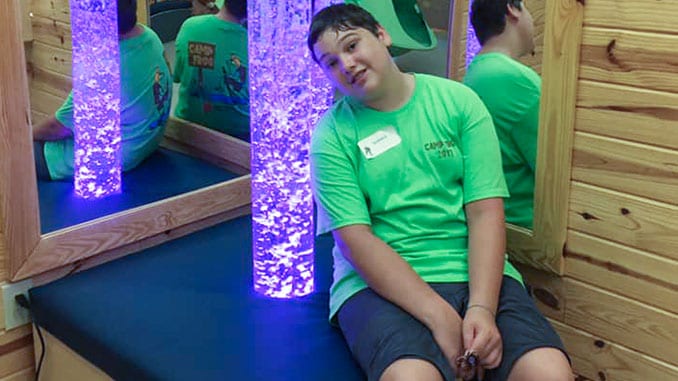
Birmingham-area recreational facilities and businesses are setting aside days or times for sensory programming.
Published: July 31, 2019
A recent news story highlights the need for sensory sensitivity in our daily school routines. Jack Higgins, a graduating senior at a Putnam County high school in New York State received a silent ovation resulting in media attention. Jack has significant auditory sensitivity and his classmates sat in silence as he graduated, to be respectful of his sensory challenges. The story highlights the need for sensory inclusiveness in our school activities. Jack’s peers, school administration and community were respectful, compassionate and kind.
Many children and adults on the autism spectrum and many not identified on the spectrum experience symptoms of Sensory Processing Disorder. In comparison to their neurotypical peers, their senses may be more sensitive to stimuli. Daily sensory input of noise, textures, light, smells and sometimes tastes might be excruciating to those with sensory challenges while the same stimuli might be barely noticed by peers. Imagine navigating a world where sounds seem louder, lights appear brighter and touch is painful. Those are the experiences of many with Sensory Processing Disorder. For these children and adults, learning is often hindered by the assault of sensory input they experience.
Because of the increase in numbers of children and adults who experience sensory challenges, many community facilities and businesses are incorporating policies and procedures that are sensory friendly or autism friendly. Many Birmingham-area recreational facilities and businesses are inviting to those with special sensory needs and additionally setting aside days or times for sensory programming. A few of the central Alabama establishments that embrace sensory challenged patrons are:
- Birmingham Museum of Art
- Birmingham Barons Regions Field
- Birmingham Zoo
- McWane Science Center
- AMC Theatres
- Red Mountain Theatre Company
- Birmingham Children’s Theatre
- Birmingham/Hoover area public libraries
- Vulcan Park
- Birmingham Shuttlesworth Airport
- Red Mountain Park
- Camp ASCCA
- YMCA
- Many Birmingham area restaurants are responsive to stated needs
- Regions Bank
The list of Birmingham-area sensory sensitive facilities is impressive. Many special needs families report that stating their needs when entering a business, community space or restaurant is often met with accommodations and assistance.
To further these community efforts, the Autism Society of Alabama has partnered with the Alabama Council on Developmental Disabilities to lead a project titled, “Autism Friendly Alabama.” The goal of the multi-year project is to support businesses in becoming autism friendly. As an added positive to the program, businesses are encouraged to hire an employee who has a developmental disability. It is going to be the challenge and responsibility for our future communities to hire and employ the large numbers of adults with developmental disabilities in future years.
Home and school are the locations where most kids spend their days. Our schools are stepping up and developing spaces for students who have sensory challenges. Schools are doing some amazing things for the developmental disability and special needs communities. By meeting sensory needs, schools are helping those with challenges to learn effectively in a calmer more controlled setting. Some of the accommodations that may assist a student with sensory challenges are:
- Classroom reading nooks can be quiet spaces marked off by mats or bean bags where a student can have quiet time
- Noise canceling headphones available in class settings when class noise level may be increased
- Options for alternative activities or quieter spaces during assemblies
- Sensory rooms with sensory manipulatives available
- Time for walking or moving around the room and stretching
- Fidget toys and sensory-friendly Mad Matter or Play-Doh
- Chewing objects
- School occupational therapist programming
- Visual or written schedules for predictability of routine and day
- Bean bag or special seating to allow movement and rocking while learning
- Weighted lap pads or blankets to calm
- Timers to predict end of activities
- Pencil grip tools
- Playground, gym and lunch buddy schedules to foster peer relationships
Parents of those with challenges should not hesitate to ask teachers which of the accommodations may work well for their classrooms. Parent advocacy often leads to student self-advocacy so that students can begin to identify what accommodations may be helpful for their unique learning style.
I dream of a day when sensory inclusiveness and sensitivity will be a part of everyday life. I think of a day when those with sensory defensiveness will go into government, community and school establishments with the expectation that their special sensory needs and disabilities will be accommodated. We are headed in the right direction and our community is responding to the needs of these valuable members of our community.
Bama Folsom Hager, Ph.D. is the parent of Henley, who is 19 years old and has autism. Hager works at the Autism Society of Alabama where she assists with Programs and Policy.
Resources:
Two resources to get started on sensory spaces at school are:
https://theinspiredtreehouse.com/23-ways-to-create-a-sensory-friendly-classroom/
